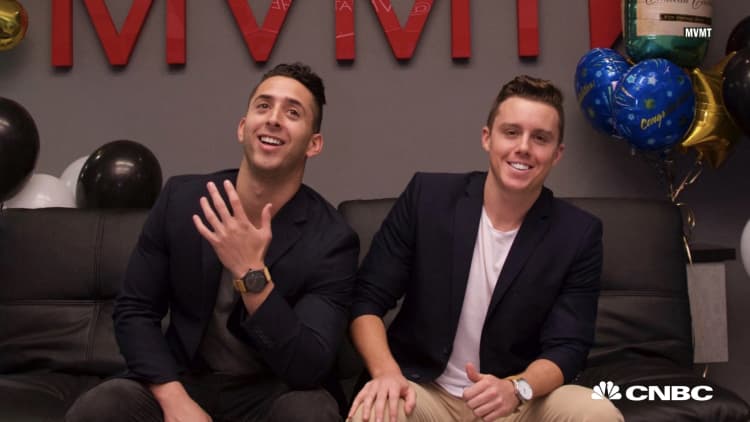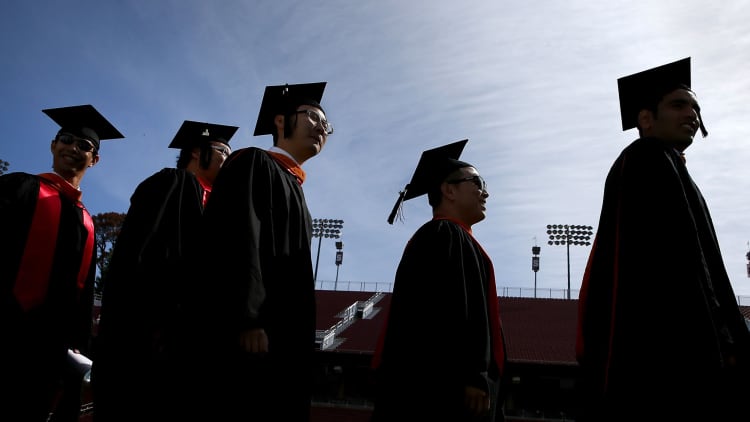Could you run your own investment fund … in college?
Ben Sender, a senior at Princeton University and founder of student-run investment fund Effective Altruism Investments (EAI), does just that.
EAI currently manages $100,000 and pursues "good returns for good causes," Sender says. The exclusive, inter-campus organization accepts just seven percent of the students from Princeton, Harvard University, University of Pennsylvania's Wharton School and Williams College who apply to join. That's about the same as Princeton's undergraduate acceptance rate.
Most of the students joining EAI are studying economics, computer science, financial engineering and math, although majors do vary. What brings them together is their interest in EAI's mission. Most of them are not invested in the fund; they're choosing to focus on managing other people's money.
"EAI is the result of intersecting passions for morality and investing, manifesting itself in a threefold mission to beat the market on a risk-adjusted basis, donate 20 percent of profits to the most worthy causes, and educate members and the community on investing and philanthropy," Sender tells CNBC Make It.
Sender, a 21-year-old from South Orange, New Jersey, grew up loving the investing world. As a high school student, he wrote for Seeking Alpha and created investing apps, including automatic stock valuation and analysis apps that garnered a total of 35,000 downloads.

At Princeton, Sender majors in economics, though he finds most of his investing education comes from outside of school.
"To be honest, school has not helped to advance my interest in investing or economics, and I believe the academic approach to business is naïve in many areas," Sender says.
It was a philosophy course that led Sender to launch Effective Altruism in 2015, which is based on the theory that one must "use evidence and careful analysis" in order to do the most good. He identified a need for a better student-run fund than ones that just go "through the motions as opposed to create genuine investment value," according to Sender.
He gathered peers to start EAI and raised an initial $60,000. The fund has since grown 67 percent through profits and new investments.

EAI's investment strategy must accommodate the need for a consistent cash flow to allocate for donations which presents a unique challenge, though the fund's small size makes it nimble, which also creates an advantage.
"We aim for overlooked assets that we can know better than the majority of market players or small illiquid assets that institutions cannot enter," says Sender.
To that end, the students invest money in a shifting balance of stocks, ETFs, options and peer-to-peer lending. Because of the fund's size, the students have to make unconventional choices to stay in the green, which has helped them so far make a profit every quarter. One of EAI's best moves was shorting Snap before its precipitous fall starting in May, which created a 107 percent gain for the investment fund.
Instead of keeping all of the profits, EAI allocates one-fifth of its gains towards charitable causes through GiveWell.com, like the Against Malaria Foundation and Give Directly.
We "have a fundamental belief in social consciousness, no matter what industry you go to," says William Chang, an EAI manager and Harvard student.
EAI's philanthropic mission falls directly in line with UBS' research on millennials. According to a June report, the "demand for using private wealth for public good" is rising, particularly among people around Sender's age.
"Altruism is quite similar to investing, as both require a truth-seeking, honest process to find the best use for money," says Sender. "The world of philanthropy needs a radical overhaul, combining business efficiency with ethical objectives."
In order to catalyze that kind of an overhaul, the members of EAI look beyond their investments to see how they can support charitable efforts around the world. Last year, EAI held an event called "Ideas Worth Funding," a charity pitch competition sponsored by Credit Suisse, and they awarded $2,500 to the Cotacachi Honey Fund, an organization run by four young men from Chicago that brings beehives and education to small farms in Ecuador so they can support themselves.
The world of philanthropy needs a radical overhaul, combining business efficiency with ethical objectives.Ben Senderfounder of Effective Altruism Investments
With the beginning of the academic year right around the corner, EAI is getting ready to recruit new members from Princeton and Harvard. The fund is also preparing to move into quantitative investing, a strategy in which complex computer algorithms sort through financial data to capitalize on patterns, in order to stay ahead of the curve.
Meanwhile, many of EAI's members will bring back sophisticated investment processes from their summer internships at firms like Blackstone, Goldman Sachs and Morgan Stanley.
"These times are notoriously difficult for active managers, with even professional hedge funds and mutual funds closing shop every day," says Sender. "We are staying disciplined in our approach, keeping the bar high and waiting for compelling opportunities."
As for Sender, after graduating in 2018, he says, "I absolutely want to work in investing, and one day I dream of starting my own hedge fund. From an investment perspective, I believe I can create a sophisticated organization that will help investors. From a philanthropic perspective, I hope to use my earnings to create effective non-profits."
Like this story? Like CNBC Make It on Facebook
Don't miss: Warren Buffett simplifies investing with a baseball analogy


